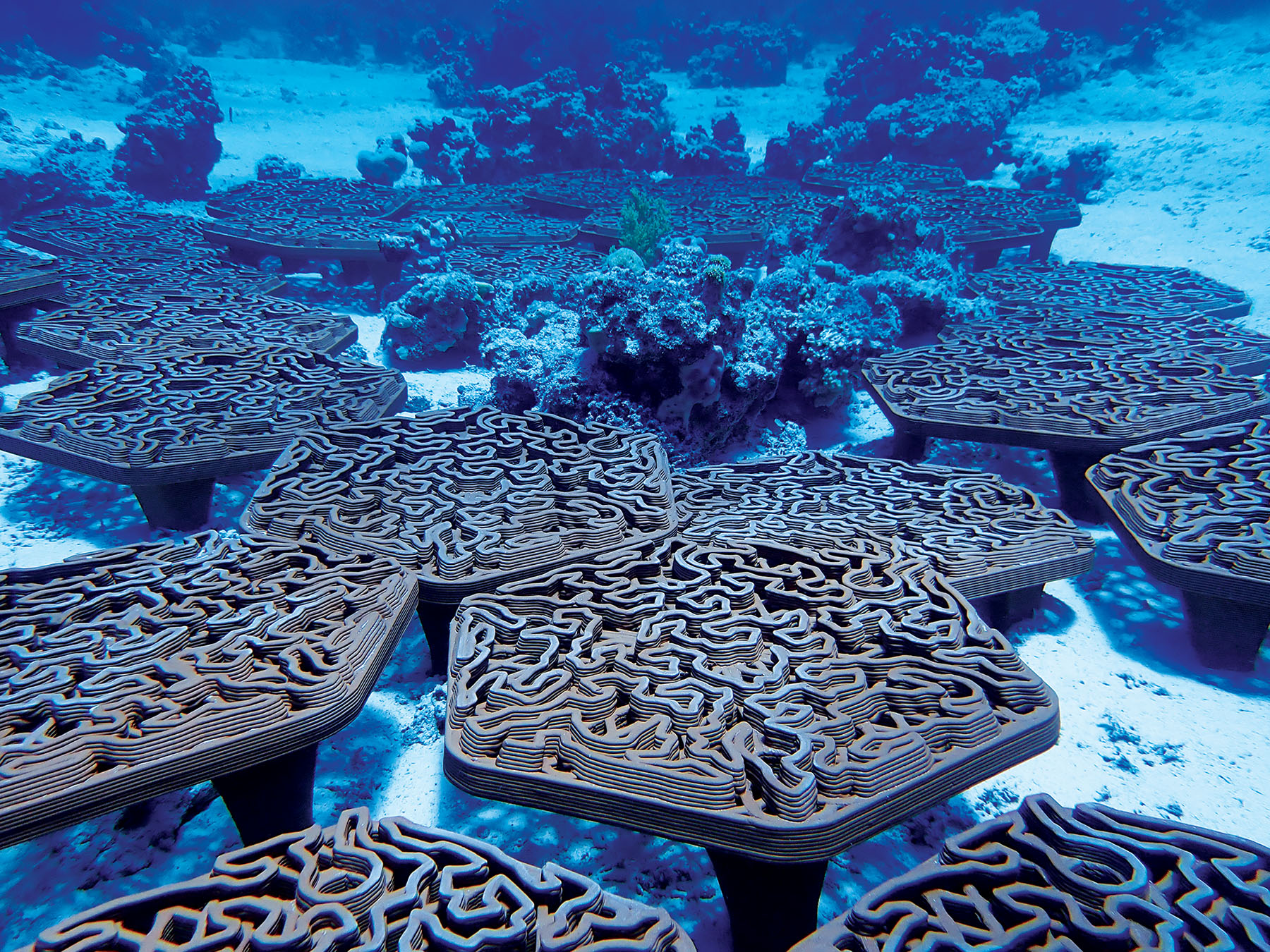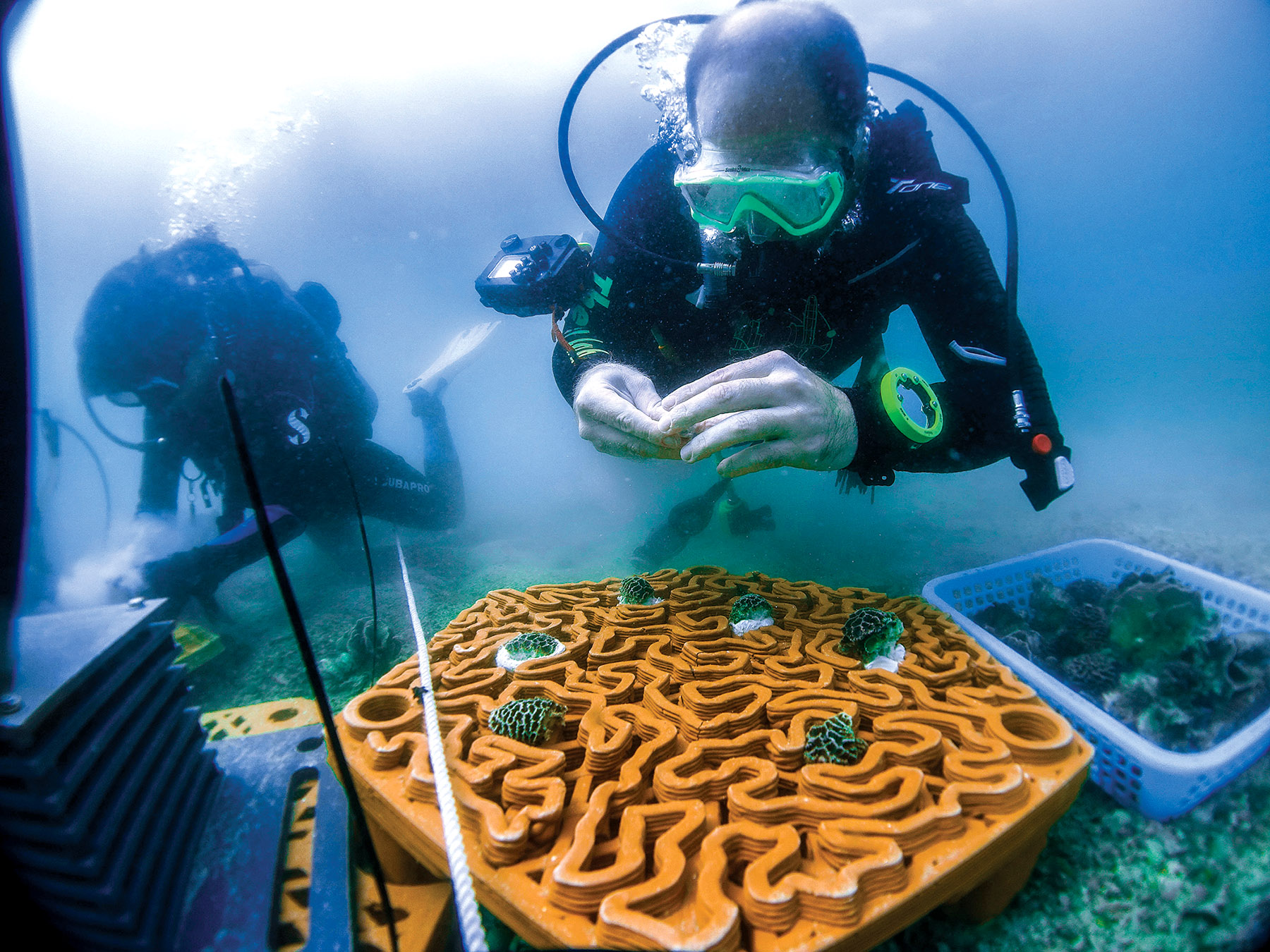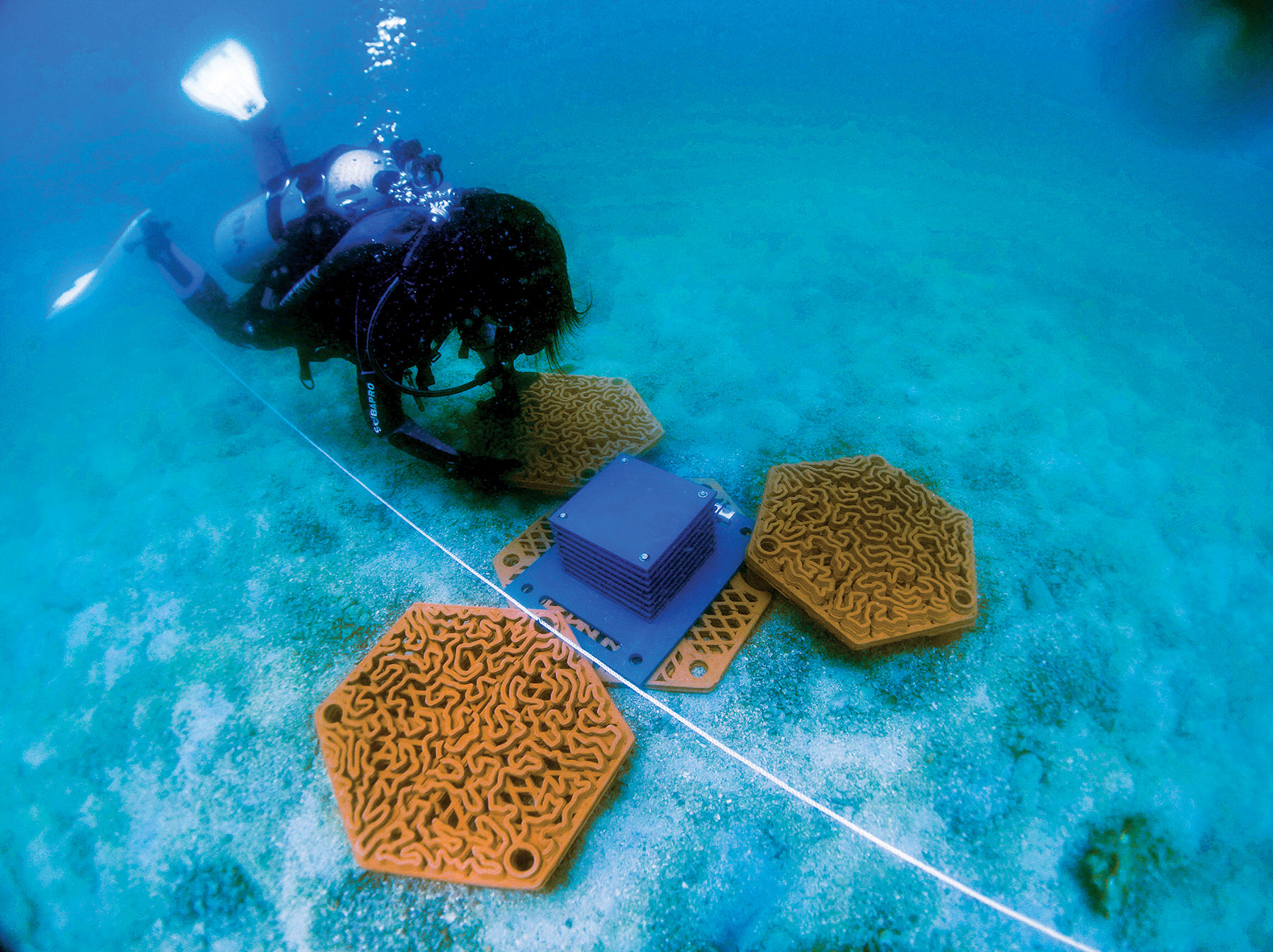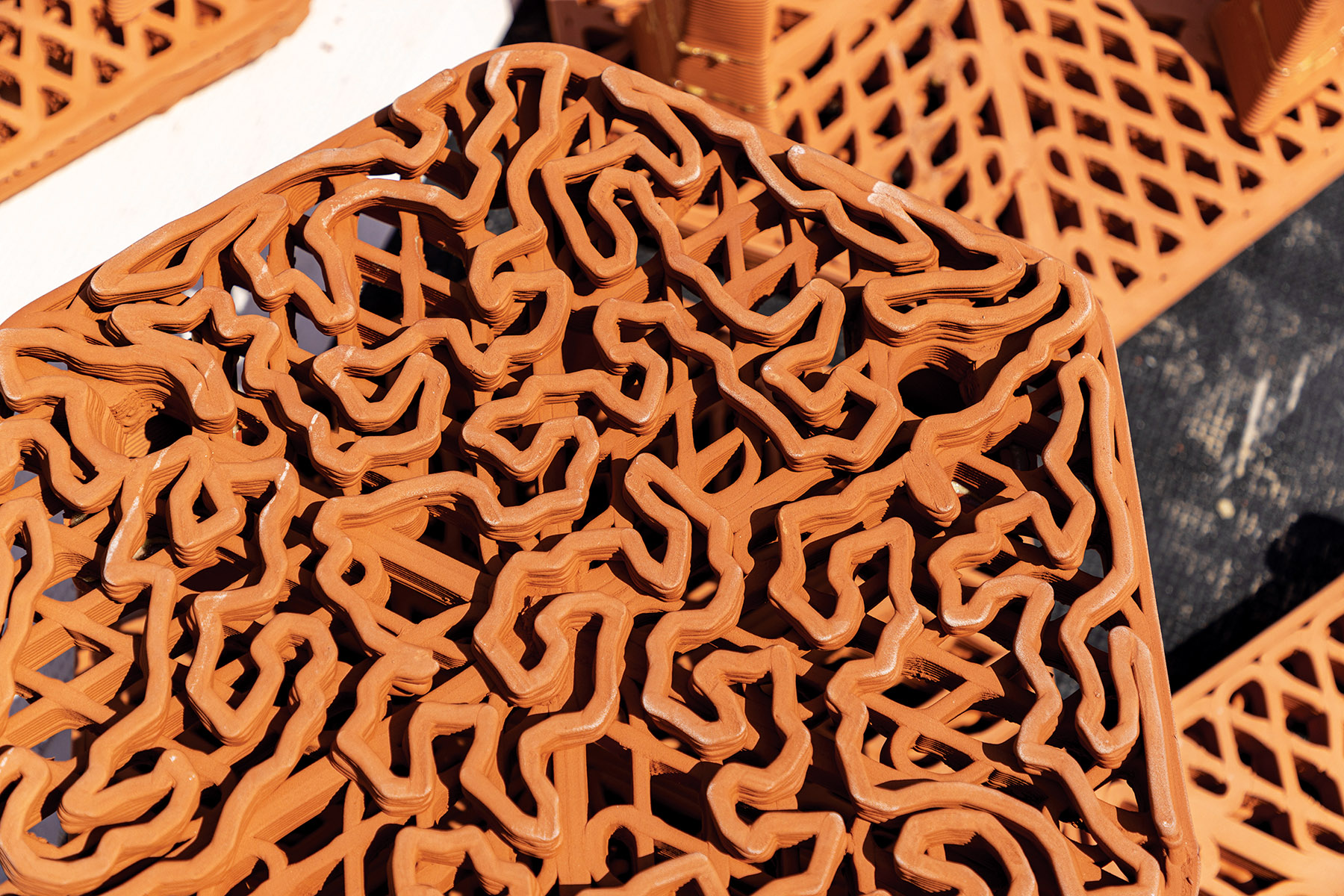Beneath Hong Kong’s surface and across the distant waters of the Middle East, pioneering technology restores coral reefs, forging global partnerships and new hope for marine ecosystems. Luo Weiteng reports.

Beyond Hong Kong’s shimmering skyline and a dense forest of skyscrapers lies a world few truly know — the natural beauty of its subtropical waters.
When Vriko Yu Pik-fan did her weekly dive and research at a marine park in eastern Hong Kong’s Sai Kung district while still at university, the captivating sights of coral gardens and the diverse array of marine life offered her a glimpse of underwater wonders. Yet the beauty can be as fleeting as it is breathtaking — a patch of corals were found to completely disappear from the coastal waters within two months.
READ MORE: Marine technology makes Greater Bay Area greener, safer
In the Tolo Harbour and Channel located in the territory’s northeastern waters, coral coverage has declined by 80 percent since the 1980s, mainly due to urban development and marine pollution, according to the World Wildlife Fund. Hong Kong’s surrounding seas are home to 84 species of hard corals — more than the entirety of the Caribbean Sea — and nurturing 25 percent of the country’s marine life.

Reviving reefs
Yu believes humanity still has a chance to act and restore corals.
Frustrating attempts to rebuild Hong Kong’s coral community with traditional methods and tools, such as plastic pipes, plastics, metal bars, as well as concrete and cinder blocks, led to the establishment of marine technology startup Archireef in 2020.
The homegrown company prides itself on world-first, 3D-printed artificial reef tiles made from non-toxic, biodegradable terracotta clay. Beneath the waves, Yu and her PhD supervisor David Baker, who co-founded Archireef, aim to give corals a root system to grow upon. Each tile is designed to mimic the complex shape of Platygyra, or “brain coral” — one of the major local coral species — helping corals to attach and adapt to a new marine world. The adjustable 3D-printed legs allow the tiles to be placed directly onto the sandy seafloor by divers without using heavy machinery.
In the first three years after its initial deployment in Hong Kong, the method returned coral reefs to health with a 95-percent probability of surviving, according to Yu.
For Yu, Hong Kong-based Archireef shows how science can leave the lab and deliver a real-world impact. To be sure, the special administrative region isn’t the limit, but it’s where everything truly begins.
In 2022, her company’s partnership with Abu Dhabi Developmental Holding Co — one of the largest sovereign wealth funds in the Middle East — came as a prelude to Archireef’s global outreach.
From the Arabian Gulf to the Red Sea, marine restoration is a pressing issue. In 2017 alone, Abu Dhabi waters, known to house 34 different coral species, lost 73 percent of their reefs from mass coral bleaching, caused by rising water temperatures, according to Abu Dhabi’s environment agency.

Archireef worked with Abu Dhabi Developmental Holding and the agency, deploying its first set of reef tiles in Abu Dhabi in 2023. “Within six months, we had seen fish abundance grow more than sixfold. And, after a year, biodiversity levels had improved by more than five times,” Yu tells China Daily.
Born and bred in the SAR, Yu turned into an eco-entrepreneur while doing her PhD at the University of Hong Kong, taking her first real step outside academia into business.
“It was an eye-opener,” she says. “I realize how much we take Hong Kong’s efficiency for granted. In a way, our well-oiled commercial and legal systems have ‘spoiled’ us because everything operates so seamlessly.”
In fledgling markets across the Middle Eastern coast, Yu has witnessed economies still in their formative stage — ambitious, rapidly evolving, yet still refining their systems to welcome global investments.
It’s a region on the move and where change is constant and palpable. The United Arab Emirates began allowing 100-percent foreign enterprise ownership about four years ago.
On Archireef’s home turf, it enjoys strong backing from Hong Kong Science and Technology Parks Corp in business development, financing and building up connections.
When the company ventured into the UAE, Yu found Abu Dhabi’s leading accelerator Hub71. Calling it a “compass”, she says Hub71 offers everything from physical workspaces to strategic hands-on guidance, helping Archireef to navigate local regulations and tailor its technology to regional needs. “It marks the first vital step in establishing our foothold in the emirate and beyond.”

Global outreach
Compared with Hong Kong’s more locally focused innovation ecosystem, Yu highlights the “outward-looking” approach Abu Dhabi takes, drawing talent, capital and ideas from across the world to anchor its growing tech scene.
Such an ecosystem has proved to be so nurturing. It has enabled the company to establish a regional eco-engineering facility at KEZAD Group — the UAE’s largest operator of integrated and purpose-built economic zones — where it produces its 3D-printed coral tiles and supports local marine restoration projects, Hub71 Startup Journey Lead Divya Nair tells China Daily in a written response.
With its operational base having moved to the emirate, Archireef has since emerged as a provider of marine restoration solutions, covering the full chain from consulting and nature-risk assessment to ecological engineering, monitoring and data reporting.
“Archireef’s journey in Abu Dhabi captures the essence of what Hub71 aims to achieve, enabling ambitious founders to bring breakthrough technologies to market and create real-world impact,” Nair says. “The collaboration between Hong Kong and Abu Dhabi is an example of how science, entrepreneurship and policy can align to drive sustainability on a global scale.”
Nair stresses that the two regions bring highly complementary strengths to the table, making collaboration “particularly meaningful”. “Hong Kong’s deep expertise in research, finance and innovation aligns well with Abu Dhabi’s focus on deploying technologies at scale and its commitment to translating ideas into real-world applications.”
ALSO READ: Studies of little-known marine species championed in HK
From climate technology to financial innovation and sustainable infrastructure, Hong Kong’s intellectual might and financial expertise are finding powerful counterparts in the Middle East’s investment muscle and market reach — a formula Nair believes is ripe for deeper engagement.
Adding to the momentum, eight Hong Kong-based Web3 startups recently made their way to Abu Dhabi through Hub71 x Hong Kong Immersion Programme, part of a broader push to connect innovators from the Chinese mainland and the SAR with the Middle East’s rising technology frontier.
In the warm waters off Abu Dhabi, new reefs — and a bigger story — are taking shape. With the launch of the Abu Dhabi Coral Garden initiative this May, creating coral habitats with 40,000 artificial reef modules made from environmentally durable materials, the emirate is engineering a more resilient coastline, and Archireef has its part to play. Where coral takes root, collaboration grows alongside it.
Contact the writer at sophialuo@chinadailyhk.com


